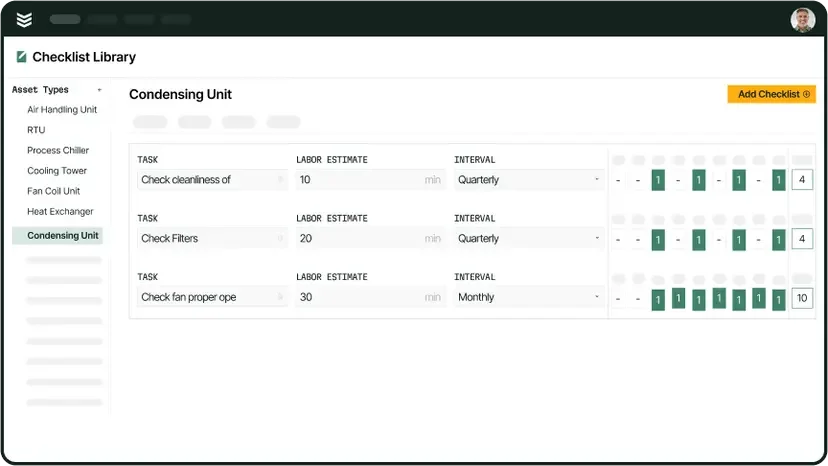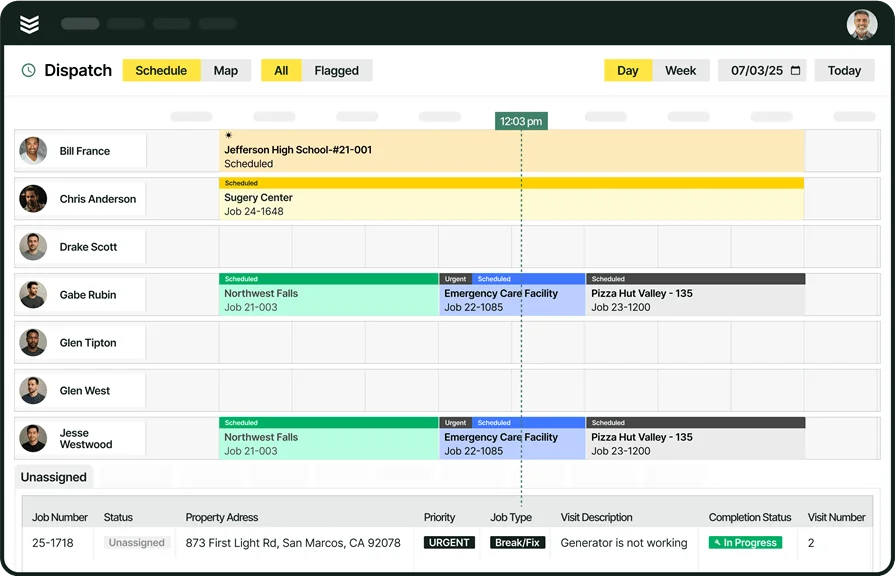If your crew is out in the field but your work orders are stuck on whiteboards, texts, or buried in someone’s inbox, it’s time for a better system. Managing field service work orders means keeping every job—from the first call to the final signature—tight, trackable, and accountable. Miss one step and you're chasing down details, redoing work, or losing track of who did what.
This guide walks field service pros through how to handle work orders from start to finish. Whether you're running HVAC installs, plumbing repairs, or electrical inspections, nailing your field work order process keeps jobs moving and teams synced. We’ll cover how field service work order management works, what a complete work order should look like, and what tools give you the edge on every call.
It also shows how the right field service management approach can help teams eliminate paperwork, cut confusion, and keep jobs flowing from dispatch to done. Here’s what we’ll cover:
- What is field service work order management?
- The essential parts of a field service work order
- How to craft an intuitive field service work order form for your customers
- 7 field service work order templates to learn from
- Top 3 field service work order management software
- 10 work order management tips for field service professionals
Keeping field service work orders tight means fewer callbacks, faster invoices, and smoother days in the field. Let’s break down what field service work order management really means—and how to set yours up right from the jump.
What is field service work order management?
A field service work order management system tracks, schedules, and completes service tasks across multiple job sites. It handles everything from assigning field service techs to documenting work, capturing approvals, and closing out jobs—making sure every work order gets done right and on time.
Field service work order management connects the office and field through a single process. Whether it’s a maintenance call or a system install, each field service work order drives how the job gets done—from who does it to how it’s billed. For contractors juggling high volumes of work, having a tight system is the only way to stay in control. Every dispatch, task update, and customer signature should be tracked in real time. That’s where modern field service work order software becomes a key tool for keeping crews moving and customers happy.
The essential parts of a field service work order
A field service work order is only as strong as the info it holds. If a tech shows up to a job without clear instructions, missing parts, or the wrong contact, you're already playing catch-up. The structure of each field work order plays a direct role in whether the job gets wrapped up on time—or drags into overtime.
Work order management in field service depends on tight coordination. From assigning tasks to closing out invoices, every job hinges on having the right data in the hands of the crew and the office. Here's what your field service work orders need to include every time:
- Job Scope and Description - A quick but clear breakdown of what the job is. This keeps techs aligned and cuts down back-and-forth calls to clarify tasks.
- Service Location and Site Contact - Includes exact address and who to reach on-site. Missing this creates delays—especially for gated properties or jobs with access restrictions.
- Assigned Tech or Crew Info - Identifies who’s handling the job. Helps avoid overlap and makes sure the field team knows where they’re supposed to be and when.
- Scheduled Time and Date - Shows when the job’s scheduled to start, plus expected duration. This info feeds into dispatch planning and customer communication.
- Required Tools and Materials - Lists any parts, equipment, or tools needed. Helps techs prep ahead so they don’t waste hours driving back for a forgotten fitting or breaker.
- Completion Notes and Customer Approval - Lets the tech document what was done and grab the customer’s signature. It ties everything together and clears the path for billing.
Each part of the field service work order plays a role in keeping your operations clean and your team on track. Next, let’s walk through how to build a field service work order form that makes life easier for your techs—and your customers.
How to craft an intuitive field service work order form for your customers
A clean work order form keeps your crew moving and your jobs tight. But if it’s cluttered, confusing, or missing key fields, things fall through the cracks fast. That’s why field-ready forms matter—especially when techs are in a crawlspace or filling it out from the cab of the truck. A solid structure makes sure the right info gets recorded every time without slowing anyone down.
If you're looking for a starting point, reviewing a solid service work order template can help visualize what works in the field—and what to avoid. But beyond the layout, how you build the form determines whether it actually helps your crew or just becomes more paperwork. Here’s how to make it count.
1. Start with only what matters
Trim the fat. Every field on your form should serve a purpose, not just fill space. Stick to the essentials: job type, service location, customer info, assigned tech, and required materials. When there’s too much, users start skipping fields. A tight, focused form gets filled out right the first time.
2. Use clear, field-ready labels
Say it like your team does. Instead of “Asset Category,” just write “Equipment Type.” If a field needs explaining, it’s too complicated. Clear labels help techs move faster and avoid confusion, especially when they’re pressed for time or filling it out in rough conditions.
3. Make it mobile-first
Your team’s not at a desk—they’re out in the field. Your form needs to load fast, display cleanly on any device, and be easy to tap through. That means no tiny buttons, long scrolling, or form fields that glitch when offline. If it doesn’t work on a phone, it doesn’t work.
4. Build in logic to save time
Use smart logic to streamline the form. If the tech selects “Inspection,” there’s no need to show repair-related fields. If it’s “Install,” open up fields for model numbers or serials. Conditional formatting helps avoid clutter and keeps techs focused on what matters for that specific job.
5. Add space for field notes and photos
Sometimes the problem isn’t obvious until boots are on-site. Make sure your form includes room for handwritten notes or voice-to-text input, along with photo uploads. Techs can snap a pic of the issue or the completed fix, which gives the back office context and protects you if any disputes come up later.

Explore our service management suite
Equip your field teams with the tools they need to keep jobs on schedule.
Next, we’ll look at real examples of field service work order templates—from simple PDFs to full-featured digital formats—and break down what they get right.
7 field service work order templates to learn from
Templates can be a great starting point, especially when you’re reworking your field service work order forms or trying to get away from handwritten tickets. While every shop runs things a little differently, these templates show how different tools structure the core details—job info, customer notes, labor, and materials—in ways that are clear and field-ready.
Whether you’re building your own system or just looking for a better form to hand your techs, these examples can help shape what your work orders should look like in the field.
1. Smartsheet
Smartsheet offers a spreadsheet-based work order template that’s clean, easy to follow, and structured for fast data entry. It’s strong on organization and works well for small teams already used to Excel-like layouts. However, it lacks mobile optimization and doesn’t connect well with field service systems out of the box.
Format: Excel / Google Sheets
Cost: Free to download
Best for: Office teams already working in spreadsheets or looking to test out digital formats before investing in a full software platform.
Take a look at the Smartsheet template to see how they handle layout and structure.
2. ServiceNow
This is a work order template built inside ServiceNow’s enterprise platform. It’s detailed and designed for multi-step workflows—ideal for IT or internal facility maintenance teams. The setup is less flexible for trades-based contractors and may feel overly complex for smaller crews.
Format: Integrated into ServiceNow (web-based)
Cost: Requires paid ServiceNow subscription
Best for: Large-scale field operations or internal teams using full-service workflow platforms.
Check out the ServiceNow template for a deeper look at how they structure workflow-heavy forms.
3. FMX
FMX’s downloadable work order form focuses on simplicity. It covers all the basic fields—requester name, description, time, and status—and includes a space for notes and attachments. It’s less customizable, but a strong fit for teams that need a clean, printable option for basic maintenance tasks.
Format: PDF
Cost: Free
Best for: Smaller operations that want to start digital but still print or email work orders.
You can download the FMX template to use as a plug-and-play form.
4. FieldEx
FieldEx offers multiple field service work order templates in various formats. Their designs are visually clean and include essential form fields like job type, service address, assigned tech, and customer sign-off. However, they lean more toward general service businesses and may need tweaking for trades.
Format: PDF / Excel
Cost: Free
Best for: Service contractors who want flexible, professional-looking forms to build on.
Explore the full set of FieldEx templates to find one that fits your jobs.
5. Monday
Monday’s template comes from their broader project management platform, offering a visually organized layout that uses boards, statuses, and timelines. It’s designed to be collaborative and can work well for service businesses that already use Monday for task tracking. That said, it requires users to be familiar with the platform to get the most out of it.
Format: Web-based / Customizable board
Cost: Free with limited features; paid plans unlock full access
Best for: Teams already managing projects inside Monday who want to add service workflows.
Review the Monday template to see how a project board format can be adapted for field service work.
6. Simpro
Simpro offers a downloadable work order template that reflects its service-focused platform. It includes fields for customer details, job type, equipment info, labor hours, and material usage. It’s structured to match how digital work orders are handled inside the Simpro system, which makes it easy to scale into software later if needed.
Format: PDF / Excel
Cost: Free
Best for: Contractors looking for a clean, exportable form that mirrors professional service software layouts.
View the Simpro template to get a sense of how digital-style work orders look on paper.
7. Vertex42
Vertex42’s Excel-based work order form is one of the most straightforward and customizable options out there. It’s built for contractors who prefer working in spreadsheets but want a polished, client-facing layout. The fields are basic but flexible, and it’s easy to tailor for different types of service calls.
Format: Excel
Cost: Free
Best for: Smaller field service teams or independent contractors who want total control over their forms without committing to a software platform.
Download the Vertex42 template if you’re looking for a practical Excel layout you can build from.
Top 3 field service work order management software
Choosing software for field service work order management isn’t just about flashy dashboards—it’s about keeping jobs on schedule, crews accountable, and work orders clean from start to finish. Whether you’re in commercial installs, residential service, or general contracting, the right tool should fit how your team actually works in the field.
We’ve broken down three of the top options based on specialization—commercial, residential, and general contractors—so you can see what each brings to the table.
1. Best for commercial: BuildOps
BuildOps is designed specifically for commercial contractors who need to manage large field teams, complex job scopes, and fast-moving schedules. It stands out with real-time work order tracking, role-based access, drag-and-drop scheduling, and deep reporting built for field visibility.
How pricing works: Custom pricing based on team size and needs, billed annually.
Features that go beyond work order management: BuildOps includes full asset management, customer portals, customizable invoicing, time tracking, and advanced reporting. The platform connects field teams with the back office through one system, keeping everything from job kickoff to billing under control.
What sets it apart for commercial: BuildOps is built specifically for commercial trades—HVAC, plumbing, electrical, and mechanical. It handles high volumes of work orders without losing clarity, and it’s optimized for multi-tech jobs and ongoing service agreements.

Take a closer look at BuildOps
We help contractors run tighter operations and manage crews—without the chaos.
2. Best for residential: PTC
Image Source: PTC
PTC is a cloud-based platform geared toward residential service contractors. It offers straightforward scheduling, digital work orders, and invoicing features that make sense for smaller teams focused on home services. While it’s intuitive and budget-friendly, it lacks deeper tools for scaling into commercial work or managing multi-crew projects.
How pricing works: Monthly subscription based on tiered features, typically starting under $100 per user.
Features that go beyond work order management: Includes customer communications, payment processing, and mobile job tracking. Some plans offer email reminders and basic service agreement handling.
What sets it apart for residential: PTC works well for one-truck or small crew shops that want to digitize work orders and get paid faster without overcomplicating the process. It’s best suited for home-based service pros rather than field teams running large projects.
3. Best for general contractors: Fieldpoint
Image Source: Fieldpoint
Fieldpoint is a flexible field service platform with a wide range of integrations and scheduling tools. It covers the basics of work order tracking and offers job costing, dispatch, and contract management. However, it can be overkill for contractors who don’t need integrations with larger ERP systems.
How pricing works: Tiered pricing based on modules and user count; custom quotes for larger deployments.
Features that go beyond work order management: Offers full project management, inventory tracking, and integration with accounting platforms like QuickBooks and Microsoft Dynamics. Mobile app features include checklists, time tracking, and field documentation.
What sets it apart for general contractors: Fieldpoint is built for service contractors who juggle multiple job types and need high-level control over project scope, financials, and crew movement. It’s a fit for firms who need software that adapts to both service and project-based work.
10 work order management tips for field service professionals
Tight work order management doesn’t happen by chance. It takes real coordination between dispatch, techs, and the back office—plus the systems that hold it all together. Whether you're running a lean crew or managing dozens of jobs a day, these tips help field service pros lock in workflows that reduce errors, speed up invoicing, and keep every job moving.
1. Always assign a single point of contact per work order
Every field service work order should have one person responsible for updates, questions, and final review—either the lead tech or a dispatcher. Without a clear owner, jobs stall and info gets buried in group chats or emails. This keeps accountability tight and gives your team one go-to when something shifts in the field.
2. Standardize the service workflow from intake to invoice
A repeatable process—from job intake to closeout—keeps everyone aligned and avoids guesswork. Your crew shouldn’t have to figure out the next step on the fly. Documenting your field service management process workflow creates consistency, especially across multiple job types or customer tiers.
3. Use KPIs to flag job delays and bottlenecks
You can’t fix what you can’t see. Track key field service metrics and KPIs like time-to-dispatch, time-to-completion, and callback rates to pinpoint where jobs are slowing down. Reviewing these regularly helps teams identify what’s dragging your work order cycle—and where to make adjustments.
4. Build real-time visibility into your reporting
Waiting until the end of the week to review job statuses or service performance creates blind spots. Real-time field service reporting lets managers spot issues early—missed tasks, lagging crews, or parts delays—and fix them before the work order falls off track. It also helps crews stay accountable in the moment.
5. Use dashboards to surface the most important data
Techs and managers don’t need more data—they need the right data. Field service dashboards help teams filter out the noise and zero in on open work orders, overdue tasks, and daily priorities. The more accessible the info, the faster crews can act on it.
Deep Dive
For more on field service dashboards, including advice on how to set them up, check out our article on field service dashboards, where we cover which ones to use and how to set them up.
6. Keep customer data tied to the work order
Having customer history, contact info, and job notes directly linked to each work order helps techs walk in prepared. This avoids repeated questions or missed details, especially on follow-up visits. A connected field service CRM software setup ensures every job includes context from past work, preferences, or special instructions—all accessible in one place.
7. Match your tools to how your team actually works
The best work order setup supports the way your crew moves through the day—on phones, in trucks, across multiple job sites. You need a system that doesn’t just hold work orders but actually fits into your field service management solution stack. Tools that adapt to your workflow—not the other way around—make adoption smoother and reduce drop-off.
8. Link work orders directly to invoicing
The longer the gap between job completion and billing, the higher the risk of missed revenue. Tying each field service work order to your invoicing software helps your back office bill faster, catch errors early, and reduce friction with customers. Bonus: techs can flag billable extras while still on-site.

Get the Invoicing Toolkit
Invoice with precision so you can cut project costs and get paid faster.
9. Schedule based on skill, not just availability
Sending the wrong tech to the wrong job costs time and damages trust. Build your dispatch process around technician expertise, certifications, or equipment familiarity—not just who’s open. This is where a smart field service dispatching system makes a difference by assigning the right person to the right job, the first time.
10. Audit your field operations every quarter
Even the best systems drift over time. A regular review of your field service operations—looking at job completion rates, time spent per task, and common delays—helps you tighten up weak points. It also keeps your crew involved and gives them a voice in how the workflow can improve.
Field service work order management holds everything together—jobs, teams, customer expectations, and cash flow. When tools are scattered or disconnected, delays pile up and details slip through the cracks. The challenge for most contractors isn’t finding software; it’s finding one platform that actually handles everything in one place.
That’s where BuildOps stands apart. For commercial contractors running complex jobs and multiple crews, an all-in-one field service platform creates a single source of truth—no double entry, no workarounds. From dispatch to documentation to invoicing, BuildOps ties it all together so your team can focus on the work—not chasing down what got missed.

Curious to see BuildOps in action?
We help commercial field teams stay sharp and on schedule—no matter the job.










